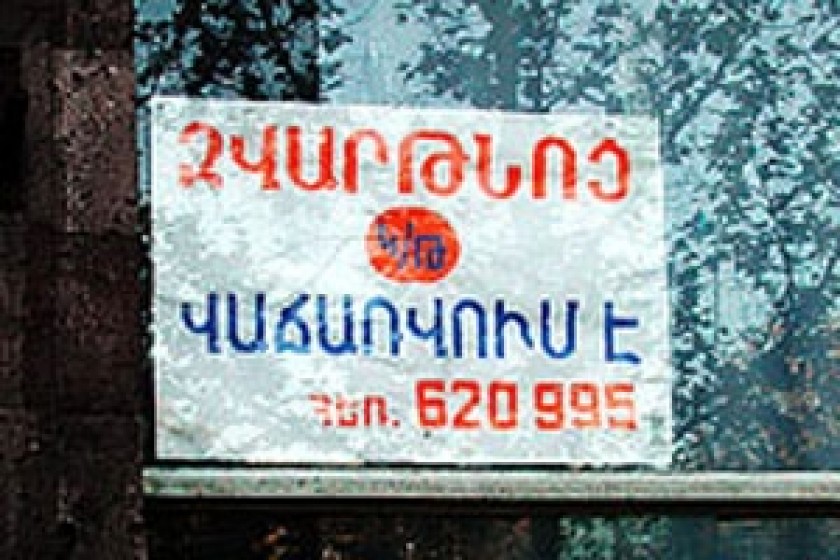
Zvartnots Cinema exports machine-tools
In 2001 and 2002 the company Yerevan Zvartnots, Ltd. exported and re-exported from Armenia a large number of machine-tools. But even though Gohar Ghazaryan was a founder of Zvartnots and the owner of 25% of the company stock, it took her two years of persistent efforts and help from the court to obtain this information. The director of the company, Lendrik Hairapetyan, controls all information on company activity and deals in strict confidence. Although documents issued by the taxation department contained a list of machine-tools and other equipment imported by Zvartnots, we discovered that the equipment had never in fact been imported from any other country. The deals were illegally registered, and the documents were falsified. The company obtained these tools from various organizations and individuals in Armenia .
Those who export machine-tools register re-export in order to be exempt from value added tax (VAT) and customs duties. Meanwhile, special permission to export is required.
The Kanaker-Zeytun territorial tax agency of Yerevan, which was conducting an inspection of Zvartnots, Ltd. for a few days in May 2003, suddenly decided to halt the inspection with this explanation, "Proceeding from the necessity to clarify some specific issues that had emerged during the inspection.the inspection has been halted by decision # 01/573-L." The only people who knew exactly what needed to be clarified were the head of the taxation agency, those who had phoned him, and the director of Zvartnots, Lendrik Hairapetyan. Why the inspection of Zvartnots Company was called off is another story. What could stop an inspection by the tax department? Of course - a call from a higher-up. And who called? The person who exports machine-tools to Iran .
In 2000 Lendrik Hairapetyan presented Gohar Ghazaryan with the new bylaws of the company, for her to sign them as a stockholder. When Ghazaryan saw that her stock was listed as being 13.5%, she refused to sign the document. The Zvartnots director registered the new company bylaws without Gohar Ghazaryan's signature. "They brought a copy of an agreement allegedly signed by Gohar among others, stating that her stock was 13.5%," Gohar's sister, lawyer Ruzan Ghazaryan recalled. "In April 2000, Gohar appealed to the Ministry of Interior stating that her signature had been forged. They conducted lengthy examinations, invited experts, took samples of her signature and concluded that it was Gohar's signature. Since then Gohar has constantly protested that it was not her signature."
It is obvious to the naked eye that the signature was forged. Gohar Ghazaryan applied to the notary office to get the original of the bylaws but she was turned down with the explanation that they could provide her with the original only at the director's written request. And director Lendrik Hairapetyan refuses to give his consent. "They won't give me the original; I am unable to obtain it," Ruzan Ghazaryan said. She represents her sister's interests in court. Gohar Ghazaryan continues to apply to various agencies stating that her signature was forged and demanding new expert examination.
In the last three years, Lendrik Hairapetyan has appealed to the court three times demanding Gohar Ghazaryan's dismissal from the company for preventing it from conducting business. The first time he withdrew his appeal, the second time the court rejected the suit, and last October he appealed to the Economic Court .
"We also appealed to the economic court demanding that the company director provide stockholder Gohar Ghazaryan documents related to company's activity and financial statements for 1996-2002," Ruzan Ghazaryan said. "The suit lasted for one year and the court ruled that the documents should be given to Gohar Ghazaryan. On March 11, 2003 we took the verdict to the Service of Obligatory Execution of Writs and only after a year, on April 3, 2004 , were a portion of these documents given to the plaintiff. According to the Law on Obligatory Execution of Wrists, the procedure was to be implemented within two months. After studying the reports we received from the court, we found out that the company had a net profit during 2001-2002. Naturally, in accordance with the Civil Code and the Law on Limited Liability Companies the company stockholders were supposed to receive dividends from the profit. So we appealed to the court for the dividends."
During the October 19, 2004 session of the Economic Court it became clear from the answers the respondent gave to Presiding Judge Karen Chilingaryan that the company had about 12 million drams (about $23,500) in profit during 2002. In response to judge's question, "What happened to the profit?" Hairapetyan responded, "In reality, there was no profit; it was in the air. We didn't make these deals, we were intermediaries; it was other people's money."
The court tried to find out where the company's profit was. According to Lendrik Hairapetyan, the money was not at the company's bank account, nor at the company's cashier's office, nor at his home. But according to the documents that Gohar Ghazaryan obtained from the Kanaker-Zeytun territorial tax agency there was a profit. One more strange thing: A few days later, when we were studying the minutes of the court session, we discovered that this part was missing.
Lendrik Hairapetyan won't say who dragged him into this story. We were only able to find out that they were representatives of one of our traditional parties. It was they who solicited the tax department to suspend the inspection at Zvartnots, Ltd. And the company's activity for the years 2003-2004 is still closed to its stockholder. Gohar Ghazaryan is forced to try to get this information again with the help of the court. If, of course, "machine-tools exporters" don't split the money with the "higher-ups" first.
 Videos
Videos Photos
Photos




Write a comment